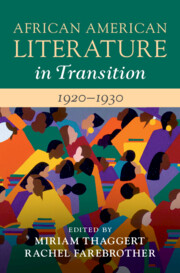Book contents
- African American Literature in Transition, 1920–1930
- African American Literature in Transition
- African American Literature in Transition, 1920–1930
- Copyright page
- Contents
- Illustrations
- Contributors
- Acknowledgments
- Chronology of Historical Events, People, and Publications, 1920–1930
- Preface
- Introduction
- Part I Habitus, Sound, Fashion
- Part II Space
- Chapter 4 Going Dutch
- Chapter 5 The Unmaking of the New Negro Mecca
- Chapter 6 Subversions of Boasian Anthropology in Zora Neale Hurston’s Great Migration Fiction and Ethnography
- Chapter 7 W. E. B. Du Bois and the Fluid Subject
- Part III Uplift Renewed
- Part IV Serial Reading
- Bibliography
- Index
Chapter 6 - Subversions of Boasian Anthropology in Zora Neale Hurston’s Great Migration Fiction and Ethnography
from Part II - Space
Published online by Cambridge University Press: 17 March 2022
- African American Literature in Transition, 1920–1930
- African American Literature in Transition
- African American Literature in Transition, 1920–1930
- Copyright page
- Contents
- Illustrations
- Contributors
- Acknowledgments
- Chronology of Historical Events, People, and Publications, 1920–1930
- Preface
- Introduction
- Part I Habitus, Sound, Fashion
- Part II Space
- Chapter 4 Going Dutch
- Chapter 5 The Unmaking of the New Negro Mecca
- Chapter 6 Subversions of Boasian Anthropology in Zora Neale Hurston’s Great Migration Fiction and Ethnography
- Chapter 7 W. E. B. Du Bois and the Fluid Subject
- Part III Uplift Renewed
- Part IV Serial Reading
- Bibliography
- Index
Summary
Reading Zora Neale Hurston's recently recovered urban stories and the first ethnography she wrote, Barracoon, Genevieve West argues that Hurston’s fictional exploration of gender tensions, ethnic conflicts, and psychological dislocation in Harlem established the contours of her emerging critique of and contribution to Boasian anthropology. There has been an abiding critical tendency to see these stories as an anomaly within Hurston’s oeuvre, but West contends that it was in her fictional portrayals of cultural conflict in Harlem that Hurston began to interrogate the objectivity that was so central to Boasian anthropology in the early decades of the twentieth century. Much Boasian anthropology was concerned with the study of “cultures as articulated wholes,” but the attention Hurston paid to cultural friction in the urban stories became a hallmark of her fictional and ethnographic explorations of black diasporic cultures from Barracoon onwards.
- Type
- Chapter
- Information
- African American Literature in Transition, 1920–1930 , pp. 154 - 176Publisher: Cambridge University PressPrint publication year: 2022

